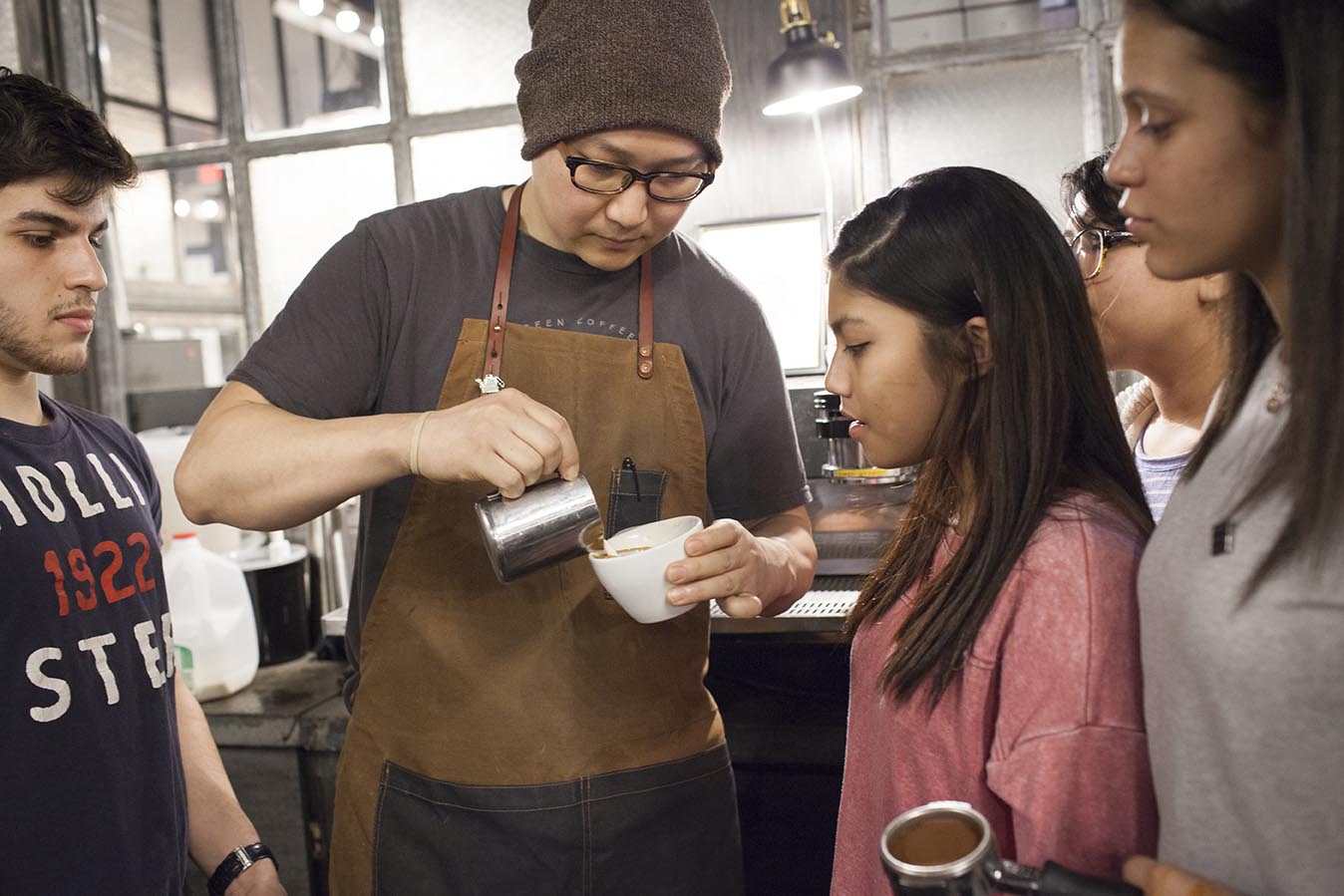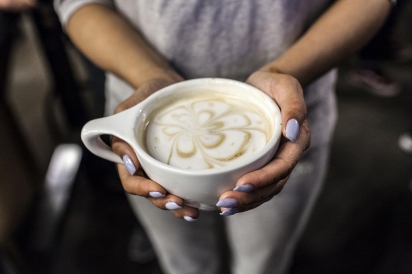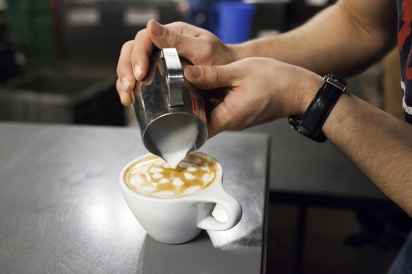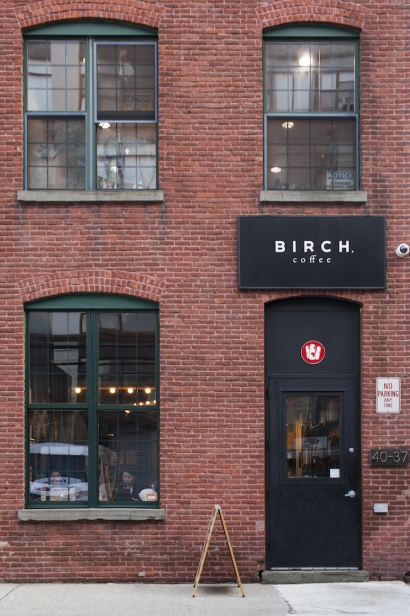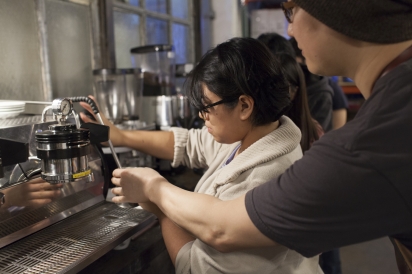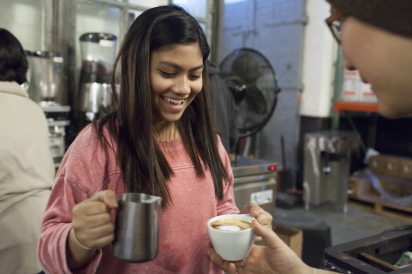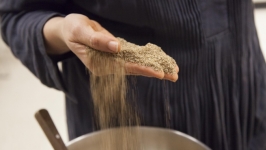Aspiring Teen Baristas Gain an Education at Java University
On Wednesdays, the tasting room at Birch Coffee’s roasting plant in Long Island City is filled with a select group of coffee connoisseurs. Students from the culinary arts program at nearby Long Island City High School congregate during after-school hours to learn more about coffee—and to see how it can shape future culinary careers.
The partnership between Birch Coffee and LIC HS is now in its second year. Birch Coffee founders Jeremy Lyman and Paul Schlader started the program with a strong desire to invest more in their community through coffee education. The fall-through-spring program educates 11th graders about coffee and fosters a positive relationship between its participants and the hospitality industry.
Students meet every week inside the roasting plant’s intimate tasting room, seated and rapt beside stacked bags of beans and state-of-the-art machinery. It’s here they learn everything from where beans are sourced to how to make the perfect cup. It’s all intended to improve and expand both their palates and technical vocabularies. Incorporated into each lesson are Birch Coffee’s fundamental principles: supporting third-wave coffee, building community, starting conversations, and sharing ideas.
“This is one channel through which we’re able to show students what’s available and that there are opportunities for a career in coffee,” said Schlader.
“We want to set a precedent that coffee roasters and shops, and local businesses by extension, are active members and participants in their communities,” added Lyman.
Through this forward-thinking environment, Lyman and Schlader hope to start a movement among the future generation of coffee drinkers and hospitality workers. At a time when a coffee franchise is poised to become the world’s largest restaurant chain, and young people see adults drinking coffee in an often hectic and disconnected way, Birch Coffee is nurturing a new, slowed down narrative. Their coffee curriculum teaches students how a local coffee shop can assist in revitalizing a neighborhood and how a cup of joe can be a conversation starter (something technology can never replace).
From an early age Jaycee Fernandez, 16, thought coffee tasted bitter. But after sampling different beans and varieties she began not only to savor the quality of raw flavors, but to trust her own point of view.
“I’m learning to appreciate food how I see it, not the way others see it,” said Fernandez.
Dreams of becoming a chef spurred 17-year-old David Rivera to sign up for the program. He credits Birch Coffee with developing a crucial asset all successful chefs need: a refined palate. Identifying notes of fruit or nuttiness has helped boost Rivera’s confidence in his culinary abilities, but discovering the importance of self-conviction and time management through the program has also played a role in his growth.
“Be there on time,” he said. “Be committed.”
For 16-year-old Jailene Chavajay, gaining knowledge about bean harvesting processes and the farms the beans come from has been significant for her understanding of the subtle differences in coffee flavors that varying cultures produce. Sixteen-year-old Yi Jing Cheng’s taste buds have experienced a point of no return. “Other coffees from fast-food chains don’t taste good,” she said. “I’ve gotten used to the sweetness of coffee that is freshly ground and brewed. I don’t think I can go back.”
Lyman and Schlader say that mentoring the students has improved their own work—the young coffee scholars are a fountain of inspiration and offer a daily dose of perspective they wouldn’t otherwise be privy to.
With over 15 years of industry experience, Lyman and Schlader welcome the new points of view. “Being around people who are observing with fresh eyes makes us appreciate how much there is to learn and discover about coffee,” said Lyman.
Alumni of the program’s inaugural year are already using their learned knowledge to kick-start their culinary careers. High school seniors Isha Husainy and Andres Galindo are just two of last year’s students who are continuing their coffee education as weekend baristas at the café inside the roasting plant. As an aspiring chef, Husainy loves her job and always wakes up excited to start her shift. And for Galindo, he considers work not only an opportunity to learn more about coffee, but also a refuge to decompress and take a break from college applications.
No matter what personal lessons each student has gained, they all agree it’s Lyman and Schlader’s passion for coffee and running their company that has impacted them most. Witnessing their devotion to doing what they love on a daily basis while contributing to the community is a lesson no textbook can teach. And the effect stays with the students, long after the caffeine buzz has worn off.
These are some cupping terms taught in the Birch Coffee program, according to Schlader:
Aroma: The fragrance of the coffee.
Flavor: Aroma plus taste equals flavor. What we smell and taste is the flavor.
Acidity: The sensation of feeling on the tastebuds. It’s the fresh fruit-liveliness of the coffee.
Body: Viscosity; the tactile feel of the liquid. Think whole milk versus skim milk.
Aftertaste: How the coffee finishes. Does it linger, with a pleasant and enjoyable finish (buttery, smooth), or does it dissipate into something unpleasant (like burnt or bitter?
Birch Coffee | @birchcoffee
Paul Schlader | @pschlader


